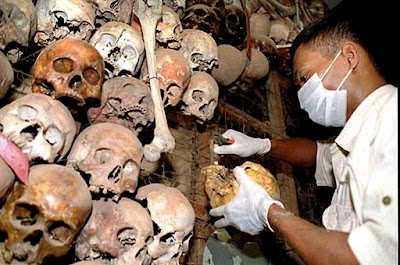 A. Gaffar Peang-Meth
A. Gaffar Peang-Meth
Pacific daily News http://www.guampdn.com/
September 2, 2009
Man is brought into the world as a free being, gifted with the mental and physical qualities that allow him to confront the challenges of daily living. Unlike animals, reliant on instinct and cunning, men are endowed with an intelligence that generally allows them to overcome complex problems and acts as a governor on man's free will.
In the political philosophy of the Western tradition, English philosopher and political theorist Thomas Hobbes wrote in "Leviathan" that men are selfish creatures, naturally wicked, interested only in promoting their own self-interest. "All mankind (is in) a perpetual and restless desire for power ... that (stops) only in death," says Hobbes, who saw the state of nature as a "war of every man against every man" and life as "solitary, poor, nasty, brutish, and short."
To rule such a world requires a powerful absolute monarch, said Hobbes.
French writer and political theorist, Jean Jacques Rousseau, whose writings were a catalyst to the French Revolution that ended absolute rule and introduced in France principles of citizenship and inalienable rights, wrote: "Man is born free, and everywhere he is in chains. One man thinks himself the master of others, but remains more of a slave than they."
Rousseau saw the primitive condition of the state of nature, devoid of law or morality, as a threat to man's survival and his freedom. Cognizant of that threat, men join together in a social contract in a civil society; abandoning their claim to "natural rights," men adopt institutions supported by laws to preserve themselves with more limited freedoms.
Armed with values, beliefs and thoughts -- acquired from socializing agents such as family, peers, schooling, religious faith, occupation, the mass media and as a result of extraordinary events -- man develops his attitudes and perceptions. Man and his environment continually interact, changing each other over time. Men institute civil structures and laws to regulate their interactions and maintain order in society.
Contemporary governments, made up of laws, policies and institutions, are organized to serve the people to attain their primary goals of adequate health, a level of contentment in life and a condition of economic self-sufficiency; and to serve the country's goals of independence, security and economic and social well-being of citizens.
A school of thought asserts that nothing is possible without men. Another warns that men are not angels so, in forming a government of men administering other men, it's the people who must watch over the government, and "auxiliary precautions" -- limits of power, checks and balances -- are essential to ensure that men do not violate others' rights.
Many a citizen sees the politics of government as corrupt and cruel as individual practitioners of politics overstretch their power, disregard laws, trample the rights of the less privileged, engage in corruption and extrajudicial killings. Some hate politics because of what Lord Buddha called, "evils of the tongue" through propagating lies and slander.
And yet, Lord Buddha never taught man to think or act with mendacity. He preached moderation, compassion, understanding, tolerance, forgiveness.
Classical Greeks used the term "politikos" to refer to the relationships between the citizens and their city state. Athens was the world's first democracy in the 5th century -- "demos" means people, "kratia" means government -- "demokratia" is a government of the people. Athens was built on the principle of free and well-informed participation in Athens' affairs as an honor and the duty of every citizen.
Man cannot be well-informed and keep his freedom if he has no interest in learning about his own and his government's rights and duties.
When French Gen. Charles de Gaulle entered politics, he declared, "I have come to the conclusion that politics is too serious a matter to be left to the politicians."
As if to highlight how "serious a matter" politics is, China's Mao Tse-tung proclaimed, "Politics is war without bloodshed while war is politics with bloodshed." England's Winston Churchill said, "In war, you can only be killed once, but in politics, many times."
Professor Kay Lawson's words are brought to mind: "Between the cradle and the grave, we live our lives in the midst of politics" -- or politics is all around us from birth to death: family politics, peer groups' politics, classroom politics, office politics, community politics, pagoda politics and so forth.
Politics refers to human activities since men and women first met on this earth, established interpersonal relations, lived together and worked on how and where to secure food to eat, make shelter, protect against animals, nature and other groups of humans. Politics, says Lawson, "is part and parcel of nearly all human interactions."
About 350,000 years ago in China, early settlers lived, worked together and made decisions affecting the whole settlement. As a means of organizing collective human activity, politics requires planning, direction, coordination; making a common decision that applies to everyone in the same way; the use of power, psychological or physical, in the collective; and development of procedures on effective ways to reach goals.
Politics is with us as we breathe. It serves the individual and the community to be learned, informed, and engaged. Greek philosopher Plato, warned more than 300 years before the birth of Christ, that we would end up "being governed by those who are dumber" or more "inferior" than ourselves if we refuse to participate in politics.
A. Gaffar Peang-Meth, Ph.D., is retired from the University of Guam, where he taught political science for 13 years. Write him at peangmeth@yahoo.com.












